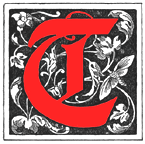
The flawed character of Shibli Bagarag, Meredith's protagonist, seems in part a satirical commentary on standard literary convention — particularly that of the hero in fantasy, romance, and epic. As Noorna astutely tells her father, the Vizier Feshnavat, "there is all in this youth, the nephew of the barber, that's desirable for the undertaking; and his feet will be on a level with the task we propose for him, he the height of man above it. 'Tis clear that vanity will trip him, but honesty is a strong upholder; and he is one that hath the spirit of enterprise and the mask of dissimulation." Feshnavat agrees with her estimate and adds that his beating has not deterred Shibli "from making further attempt on Shagpat. . . . He will be one of us as we are, devoted to the undertaking by three bonds — the bond of vengeance, the bond of ambition, and that of love" ("The Betrothal). The "spirit of enterprise" might well appear a standard Victorian virtue, but what are we to make of "the mask of dissimulation"? Granted that displacement of events into an imaginary version of the Middle East prevents us from relating them too directly to Victorian England, but nonetheless it does approve qualities not officially endorsed by the culture of Meredith and his readers.
Shibli's vanity, on the other hand, clearly appears as a major flaw in his character, and the text frequently mocks him for it. For example, when Noorna tells him that Fate has chosen him, "the knowledge that he was selected by destiny as Master of the Event inflated him; and he was a hawk in eagerness, a peacock in pride, an ostrich in fulness of chest. . . . Thereupon he exulted, and his mind strutted through the future of his days, and down the ladder of all time, exacting homage from men, his brethren; and 'twas beyond the art of Noorna to fix him to the present duties of the enterprise: he was as feathered seed before the breath of vanity" ("The Betrothal).
This vanity leads him repeatedly to fail the tests of the romance protagonist and further qualifies his heroism or status as hero. In "The Horse Garaveen" he succumbs to pride, does not listen to Noorna, and almost destroys them both when he thinks he can control the magical beast. In the "The Palace of Aklis" he again succumbs to vanity, finds himself crowned with an ass's ears, and saves himself only by the good humor that convulses him with laughter at his own stupidity and weakness — a fantastic event that embodies Meredith's theories of comedy and laughter. In "The Veiled Figure" he fails yet another time when he tries to see the forbidden, after which Abarak, a follower acquired during the quest, mutters, "His star is a strange one! one that leadeth him to fortune by the path of frowns! to greatness by the aid of thwackings!" ("The Veiled Figure"). The penalty for thus falling to "the third temptation in Aklis," Shibli recognizes, is that "I am made to employ deceits ere I strike" rather than conquering in some direct, heroic manner ("The Plot").
The character of Meredith's protagonist has several main functions and effects, only one of which is to qualify and even parody the conventions of heroism, fantasy, and romance. An even more interesting result or purpose lies in the fact that the limited male hero who so obviously depends on a woman's sense and heroism qualifies the male ideal. In fact, Shibli, who soon admits his dependence on Noorna, shares glory and center stage with her. The inversion of usual narrative conventions of hero and heroine, lover and beloved, appear in the fact that she chooses him and not the other way round. The story enforces this inversion of the expected when at the opening of the chaoter entitled "The Revival," she inverts the Sleeping Beauty story, in which the male awkens the female, by kissing the hero awake!
Last modified 13 October 2004